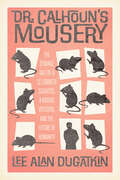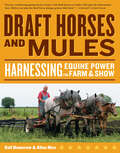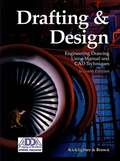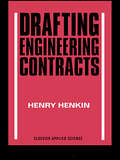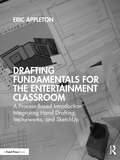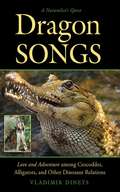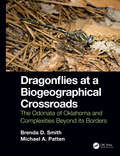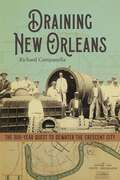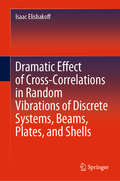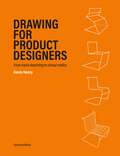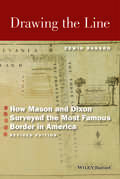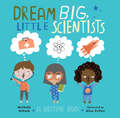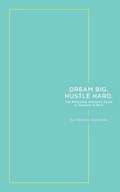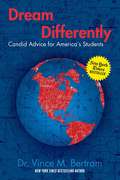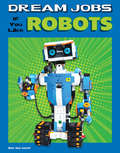- Table View
- List View
Dr. Calhoun's Mousery: The Strange Tale of a Celebrated Scientist, a Rodent Dystopia, and the Future of Humanity
by Lee Alan Dugatkin“Brilliant. . . . An absorbing read and a potent lesson in moral behavior—both of rodents and of humans.”—Deborah Blum, Pulitzer Prize–winning author of The Poison Squad • “A fascinating read about an immensely influential scientist.”—Robert M. Sapolsky, author of the New York Times–bestseller Determined • “Stimulating scientific history. . . . Colorful accounts. . . . This fascinates.”—Publishers Weekly A bizarre and compelling biography of a scientist and his work, using rodent cities to question the potential catastrophes of human overpopulation. It was the strangest of experiments. What began as a utopian environment, where mice had sumptuous accommodations, had all the food and water they could want, and were free from disease and predators, turned into a mouse hell. Science writer and animal behaviorist Lee Alan Dugatkin introduces readers to the peculiar work of rodent researcher John Bumpass Calhoun. In this enthralling tale, Dugatkin shows how an ecologist-turned-psychologist-turned-futurist became a science rock star embedded in the culture of the 1960s and 1970s. As interest grew in his rodent cities, Calhoun was courted by city planners and his work was reflected in everything from Tom Wolfe’s hard-hitting writing to the children’s book Mrs. Frisby and the Rats of NIMH. He was invited to meetings with the Royal Society and the pope and taken seriously when he proposed a worldwide cybernetic brain—a decade before others made the internet a reality. Readers see how Calhoun’s experiments—rodent apartment complexes like “Mouse Universe 25”—led to his concept of “behavioral sinks” with real effects on public policy discussions. Overpopulation in Calhoun’s mouse (and rat) complexes led to the loss of sex drive, the absence of maternal care, and a class of automatons that included “the beautiful ones,” who spent their time grooming themselves while shunning socialization. Calhoun—and those who followed his work—saw the collapse of this mouse population as a harbinger of the ill effects of an overpopulated human world. Drawing on previously unpublished archival research and interviews with Calhoun’s family and former colleagues, Dugatkin offers a riveting account of an intriguing scientific figure. Considering Dr. Calhoun’s experiments, he explores the changing nature of scientific research and delves into what the study of animal behavior can teach us about ourselves.
Dr. Folkman's War
by Robert Cooke C. Everett KoopIn 1961, twenty-eight-year-old Dr. Judah Folkman saw something while doing medical research in a United States navy lab that gave him the first glimmering of a wild, inspired hunch. What if cancerous tumors, in order to expand, needed to trigger the growth of new blood vessels to feed themselves? And if that was true, what if a way could be found to stop that growth? Could cancers be starved to death? Dr. Folkman had ample reason to be self confident - second in his class at Harvard Medical School, he was already considered one of the most promising doctors of his generation. But even he never guessed that his idea would eventually grow into a multibillion-dollar industry that is now racing through human trials with drugs that show unparalleled promise of being able to control cancer, as well as other deadly diseases.For the creation of this book, Dr. Judah Folkman cooperated fully and exclusively with acclaimed science writer Robert Cooke. He granted Cooke unlimited interviews, showed him diaries and personal papers, and threw open the doors of his lab. The result is an astonishingly rich and candid chronicle of one of the most significant medical discoveries of our time and of the man whose vision and persistence almost single-handedly has made it possible.Dr. Folkman's radical new way of thinking about cancer was once considered preposterous. So little was known about how cancer spreads and how blood vessels grow that he wasn't even taken seriously enough to be considered a heretic. Other doctors shook their heads at the waste of a great mind, and ambitious young medical researchers were told that accepting a position in Folkman's lab would be the death of their careers. Now, though, the overwhelming majority of experts believes that the day will soon come when antiangiogenesis therapy supplants the current more toxic and less-effective treatments - chemotherapy, radiation, and surgery-as the preferred method of treatment for cancer in patients around the world, and Dr. Folkman's breakthrough will come to be taken for granted the way we now take for granted the polio vaccine and antibiotics.REVIEWSDr. Folkman's War brilliantly describes how high the odds are against success in medical research, how vicious the competition for grants, how entrenched the skepticism about any genuinely original thinking, how polluted by politics and commerce the process of getting medicine into patients' hands. But it also depicts with rare power how exalted a calling medicine can be and how for the rare few-the brilliant, the tireless, and the lucky - the results of success can be world-changing."Judah Folkman's answer-stop cancers by cutting off their blood supplies-has much too long been thought of as too simple to ever work. Now, however, a broad set of antiangiogenic agents based on Judah's ideas are coming on line. The verdict 'cancer' need no longer be synonymous with fear and despair. Our country's 'war against cancer' at last has found its general."-JAMES D. WATSON, winner of the Nobel Prize and author of The Double Helix"It is said that genius disdains the beaten path, and that's certainly true of Dr. Judah Folkman. He has suffered for it, but his imagination, his persistence-and yes, his glorious obsession-will benefit us all. We owe him our boundless gratitude."-JONATHAN HARR, author of A Civil Action"Rarely in the history of modem biomedical research has a major advance been attributable directly to the energies and vision of a single individual. This is such a story, about one man's vision, drive, indeed obsession with an idea that will one day dramatically change cancer therapy."-ROBERT A. WEINBERG, Whitehead Institute for Biomedical Research and MIT, author of One Renegade Cell: How Cancer Begins and Racing to the Beginning of the Road: The Search for the Origin of Cancer"I first encountered Judah Folkman when I was a surgical intern at Boston City Hospital. His already legendary crisp intellect provided a logical scaffold for my understanding of complex diseases. Judah, full of warmth and humanity, inspired me and gen...
Dr. Folkman's War: Angiogenesis and the Struggle to Defeat Cancer
by Robert CookeIn 1961, twenty-eight-year-old Dr. Judah Folkman saw something while doing medical research in a United States navy lab that gave him the first glimmering of a wild, inspired hunch. What if cancerous tumors, in order to expand, needed to trigger the growth of new blood vessels to feed themselves? And if that was true, what if a way could be found to stop that growth? Could cancers be starved to death? Dr. Folkman had ample reason to be self confident -- second in his class at Harvard Medical School, he was already considered one of the most promising doctors of his generation. But even he never guessed that his idea would eventually grow into a multibillion-dollar industry that is now racing through human trials with drugs that show unparalleled promise of being able to control cancer, as well as other deadly diseases. For the creation of this book, Dr. Judah Folkman cooperated fully and exclusively with acclaimed science writer Robert Cooke. He granted Cooke unlimited interviews, showed him diaries and personal papers, and threw open the doors of his lab. The result is an astonishingly rich and candid chronicle of one of the most significant medical discoveries of our time and of the man whose vision and persistence almost single-handedly has made it possible. Dr. Folkman's radical new way of thinking about cancer was once considered preposterous. So little was known about how cancer spreads and how blood vessels grow that he wasn't even taken seriously enough to be considered a heretic. Other doctors shook their heads at the waste of a great mind, and ambitious young medical researchers were told that accepting a position in Folkman's lab would be the death of their careers. Now, though, the overwhelming majority of experts believes that the day will soon come when antiangiogenesis therapy supplants the current more toxic and less-effective treatments -- chemotherapy, radiation, and surgery-as the preferred method of treatment for cancer in patients around the world, and Dr. Folkman's breakthrough will come to be taken for granted the way we now take for granted the polio vaccine and antibiotics. Dr. Folkman's War brilliantly describes how high the odds are against success in medical research, how vicious the competition for grants, how entrenched the skepticism about any genuinely original thinking, how polluted by politics and commerce the process of getting medicine into patients' hands. But it also depicts with rare power how exalted a calling medicine can be and how for the rare few--the brilliant, the tireless, and the lucky -- the results of success can be world-changing. From the Hardcover edition.
Dr. Hyde and Mr. Stevenson
by Harold Winfield KentDr. Hyde and Mr. Stevenson: the life of the Rev. Dr. Charles McEwen Hyde, including a discussion of the open letter of Robert Louis Stevenson.
Dr. Space
by Bob WardWritten by veteran aerospace journalist Bob Ward, who spent years investigating his subject, this biography presents a revealing but even-handed portrait of the father of modern rocketry. As he chronicles Wernher von Braun's life, Ward explodes many myths and misconceptions about the controversial genius who was a hero to some, a villain to others. The picture of von Braun that emerges is of a brilliant scientist with limitless curiosity and a drive to achieve his goals at almost any price from, developing the world's first ballistic missile used against the Allies in World War II to helping launch the first U.S. satellite that hurled Americans into space and the Saturn V super-booster that powered them to the moon. Along the way readers are introduced to the human side of this charismatic visionary who brought the United States into the Space Age.
Drachenzucht für Einsteiger: Ein "gefährlicher" Zeitvertreib für Hobby-Genetiker
by Paul Knoepfler Julie KnoepflerKann man einen Drachen züchten? Kann er dann Feuer spucken und fliegen? Können wir ihm eine eindrucksvolle Größe verleihen? Wie schlau sollen wir unseren Drachen machen, und können wir ihn trainieren? Wie wahrscheinlich ist es, dass wir bei unserem Versuch, einen Drachen zu bauen, umkommen? Und geht das auch mit Einhörnern?Die Welt begeistert sich seit Jahrhunderten für Drachen und sie haben noch immer einen festen Platz in der Popkultur wie Smaug in „Der kleine Hobbit“ und die Drachen in „Game of Thrones“. Die Leute lieben Drachen und sind neugierig zu erfahren, ob man tatsächlich einen Drachen erschaffen kann. In diesem ungewöhnlichen Buch geht es darum, wie wir mit den allerneuesten wissenschaftlichen Techniken theoretisch einen Drachen erschaffen könnten. Dabei behandeln wir modernste wissenschaftliche Themen wie CRISPR, Biohacking, Stammzellenforschung und Bioengineering. Das Buch steckt voller Fakten, doch der Humor kommt nicht zu kurz, und es regt Leser*innen überdies an, sich Gedanken über den Einfluss von Wissenschaft und Technik auf unsere Gesellschaft zu machen. Unterwegs wirft das Buch einen satirischen Blick auf die Wissenschaft an vorderster Front, die oft in den Medien maßlos gehypt wird. Es diskutiert Schlüsseltechnologien, die ins Spiel kommen, wenn wir uns vorstellen, unsere Idee, einen Drachen zu bauen, in feuerspuckende Realität umzusetzen. Während wir all diese Themen diskutieren, sprechen wir auch über die ethischen Probleme, die sich beim „Bau“ eines Drachens ergeben, und die Möglichkeiten, einen ähnlichen Ansatz zu nutzen, um andere mythische Wesen, wie z.B. ein Einhorn, zu erschaffen. Dieses Buch, das jeden ansprechen sollte, enthält viele eindrucksvolle Illustrationen und andere interessante Abbildungen, darunter Drachendarstellungen, Bilder von Flugsaurierskeletten und vieles mehr.
Draft Horses and Mules: Harnessing Equine Power for Farm & Show
by Gail Damerow Alina RiceHardworking and intelligent, draft horses and mules provide clean-energy power for an impressive array of tasks. Bringing strength and endurance to every job, from cultivating farmland and hauling logs to giving long quiet rides through the countryside, these animals love to work. In this illustrated guide, Gail Damerow and Anita Rice provide all the information you need in order to select, train, feed, care for, and work with your own team of draft horses or mules.
Drafting & Design: Engineering Drawing Using Manual and CAD Techniques
by Clois E. Kicklighter Walter C. BrownNIMAC-sourced textbook
Drafting Engineering Contracts
by H HenkinThis E. & F. N. Spon title is now distributed by Routledge in the US and Canada This title available in eBook format. Click here for more information.Visit our eBookstore at: www.ebookstore.tandf.co.uk.
Drafting Fundamentals for the Entertainment Classroom: A Process-Based Introduction Integrating Hand Drafting, Vectorworks, and SketchUp
by Eric AppletonDrafting Fundamentals for the Entertainment Classroom: A Process-Based Introduction to Hand Drafting, Vectorworks, and SketchUp guides students through a syllabus-formatted semester of integrated drafting concepts and skills. This book links beginner visualization practices with fundamental software knowledge through step-by-step exercises and examples. By presenting hand drafting and Vectorworks through incremental exercises, students not only gain an understanding of the tools used in drafting but also learn why the tools, practices, and standards exist in the first place. SketchUp, a user-friendly 3D modeling program, is integrated into the various exercises to help readers visualize concepts and begin modeling their own ideas. By the end of the book, students will understand drawing construction techniques, United States Institute for Theatre Technology (USITT)-recommended graphic standards, and the typical drawings created for entertainment design, preparing them to dive more deeply into the further complexities and opportunities of Vectorworks and SketchUp. Drafting Fundamentals for the Entertainment Classroom is written to complement a 14- or 15-week semester of an Entertainment Drafting course. The book’s format also provides structure for independent and self-directed study.
Dragon Songs: Love and Adventure among Crocodiles, Alligators, and Other Dinosaur Relations
by Vladimir DinetsA born naturalist and a fearless traveler, Vladimir Dinets wrote travel guides, conducted field research, and lived a couple of lives before he was accepted into the PhD program in zoology at the University of Miami. He thought crocodiles were a dead-end research topic--survivors from the age of the dinosaurs but not much else--until he witnessed groups of up to seventy alligators performing mating choruses that included infrasound vibrations--a form of communication extremely rare in nature--and a "dance" unknown in the scientific literature but that resembled a scene from Jurassic Park. To prove his thesis about the language of crocodiles, he spent the next six years traveling around the world on shoestring budgets and in extreme circumstances, studying almost every living species. At the same time, as a man desiring companionship in life, he sought love.With adventures on five continents, Dragon Songs is his account of this quest. It includes an escape from a boiling lava lake in the Afar Desert, being chased up a tree by a tiger in India, hitching a ride with a cocaine smuggler in Bolivia, and diving with giant Greenland sharks--all in the name of studying crocodiles, among which he routinely paddled in his inflatable kayak. Of course, not everything went according to plan. But, in the end, his ground-breaking research helped change the field. And during the course of his adventures, he met and courted his future wife.
Dragonflies at a Biogeographical Crossroads: The Odonata of Oklahoma and Complexities Beyond Its Borders
by Brenda D. Smith Michael A. PattenThis lavishly illustrated book examines the distribution, ecology, conservation status, and biogeography of 176 species of dragonflies in the southern plains of the United States, where twelve ecoregions converge. The topics discussed, such as phenotypic variation and ecology, are applicable and of interest across the United States and much of north America, and will appeal to researchers and dragonfly enthusiasts alike. A series of maps, including a distributional map by specific locality of occurrence, indicate level of documentation and allow the reader to visualize the biogeographical associations of a given species. These maps also encourage citizen scientists to contribute documentation wherever they spend time in the field. Context-driven chapters, including one on the region’s rich paleontological history, blend environmental history and biogeography, giving the book a fresh perspective on the natural world while providing a rich summary of the odonates. Dragonflies at a Biographical Crossroads: The Odonata of Oklahoma and Complexities Beyond Its Borders will be sought out by dragonfly researchers and enthusiasts, entomologists, amateur naturalists, paleontologists, conservation biologists, educators, regional historians, and those seeking to meld the disciplines of cultural and environmental history with biology. It will also be readily accessible to the lay public. Dragonflies combine the visually stunning with acrobatic fireworks in ways no other insect can hope to combine.
Dragonfly: NASA and the Crisis Aboard MIR
by Bryan BurroughBased on released NASA documents and interviews
Dragons vs. Unicorns (Kate the Chemist)
by Kate BiberdorfScience explosions! Theater! Mystery! Friendship! Fifth grader Kate the Chemist uses STEM knowledge to do incredible things! Kate the Chemist is a ten-year-old science problem solver. There's no problem Kate can't fix! When her best friend, Birdie, is cast as the lead unicorn in their school's musical Dragons vs. Unicorns, and Kate is chosen to be the assistant director, they agree this is going to be the best musical EVER! Kate is a natural assistant director; like all good scientists, she's smart and organized, but she also comes up with great ideas. But when everything starts going wrong with the musical and Kate realizes someone is sabotaging the show, will her special science sleuthing skills help save the day--and the show?Help young Kate the Chemist as she solves science problems in her community, starting with the school musical: Dragons vs. Unicorns!Praise for Kate the Chemist: Dragons vs. Unicorns:"Proves that science and fun go together like molecules in a polymer."--School Library Journal
Drainage Details
by L. WoolleyA unique set of 45 information sheets giving complete details of all forms of drainage work for the builder and surveyor.
Draining New Orleans: The 300-Year Quest to Dewater the Crescent City
by Richard CampanellaIn Draining New Orleans, the first full-length book devoted to “the world’s toughest drainage problem,” renowned geographer Richard Campanella recounts the epic challenges and ingenious efforts to dewater the Crescent City. With forays into geography, public health, engineering, architecture, politics, sociology, race relations, and disaster response, he chronicles the herculean attempts to “reclaim” the city’s swamps and marshes and install subsurface drainage for massive urban expansion.The study begins with a vivid description of a festive event on Mardi Gras weekend 1915, which attracted an entourage of elite New Orleanians to the edge of Bayou Barataria to witness the christening of giant water pumps. President Woodrow Wilson, connected via phoneline from the White House, planned to activate the station with the push of a button, effectively draining the West Bank of New Orleans. What transpired in the years and decades that followed can only be understood by examining the large swath of history dating back two centuries earlier—to the geological formation and indigenous occupation of this delta—and extending through the colonial, antebellum, postbellum, and Progressive eras to modern times. The consequences of dewatering New Orleans proved both triumphant and tragic. The city’s engineering prowess transformed it into a world leader in drainage technology, yet the municipality also fell victim to its own success. Rather than a story about mud and machinery, this is a history of people, power, and the making of place. Campanella emphasizes the role of determined and sometimes unsavory individuals who spearheaded projects to separate water from dirt, creating lucrative opportunities in the process not only for the community but also for themselves.
Dramatic Effect of Cross-Correlations in Random Vibrations of Discrete Systems, Beams, Plates, and Shells
by Isaac ElishakoffThis volume explains the dramatic effect of cross-correlations in forming the structural response of aircraft in turbulent excitation, ships in rough seas, cars on irregular roads, and other dynamic regimes. It brings into sharp focus the dramatic effect of cross correlations often neglected due to the analytical difficulty of their evaluation. Veteran author Professor Isaac Elishakoff illustrates how neglect of cross correlations could result in underestimation of the response by tens or hundreds of percentages the effect of the random vibrations of structures’ main elements, including beams, plates, and shells.
Drawing for Product Designers Second Edition: From Hand Sketching to Virtual Reality
by Kevin HenryDesigners do far more than visualize new products; they are called upon to imagine a future and bring it to life through visuals. Whether such futures begin as elaborate maps and diagrams of emerging technology or speculative "world-building," the contemporary designer's skill set must cover the entire spectrum, from abstract to representational, and from "low fidelity" to "high fidelity" visualizations.The advent of tablet-based sketching, VR sketching, and hybrids bring new and more intuitive ways of working. But confidence in manipulating lines, curves, and surfaces in space (whether flat, computer-assisted, or virtual) will remain a coveted skill regardless of where technology leads. In this practical guide to both hand-and computer-drawn design, essential principles are outlined so that readers will learn to think in 3D and build complex design ideas that are structurally sound and visually clear. Specially created sketches and computer models show how to develop rough sketches into finished illustrations, while also explaining how to select the right type of representation for the right purpose. This revised edition contains new material on sketching principles, working across platforms, and hybrid workflows. Also new to this edition: coverage of UX/UI design for smart devices and digital platforms, and information on cutting-edge technology such as AI tools and intuitive and collaborative VR sketching platforms. There are fifteen new case studies featuring work by leading designers, and a selection of videos further illuminate themes discussed in the book.List of chapters: The Sketching Spectrum Perspective Visual/Spatial Overview Orientation Registration Form Line Exploring Ideas in Space and Time Sketching and Storytelling
Drawing for Product Designers Second Edition: From Hand Sketching to Virtual Reality
by Kevin HenryDesigners do far more than visualize new products; they are called upon to imagine a future and bring it to life through visuals. Whether such futures begin as elaborate maps and diagrams of emerging technology or speculative "world-building," the contemporary designer's skill set must cover the entire spectrum, from abstract to representational, and from "low fidelity" to "high fidelity" visualizations.The advent of tablet-based sketching, VR sketching, and hybrids bring new and more intuitive ways of working. But confidence in manipulating lines, curves, and surfaces in space (whether flat, computer-assisted, or virtual) will remain a coveted skill regardless of where technology leads. In this practical guide to both hand-and computer-drawn design, essential principles are outlined so that readers will learn to think in 3D and build complex design ideas that are structurally sound and visually clear. Specially created sketches and computer models show how to develop rough sketches into finished illustrations, while also explaining how to select the right type of representation for the right purpose. This revised edition contains new material on sketching principles, working across platforms, and hybrid workflows. Also new to this edition: coverage of UX/UI design for smart devices and digital platforms, and information on cutting-edge technology such as AI tools and intuitive and collaborative VR sketching platforms. There are fifteen new case studies featuring work by leading designers, and a selection of videos further illuminate themes discussed in the book.List of chapters: The Sketching Spectrum Perspective Visual/Spatial Overview Orientation Registration Form Line Exploring Ideas in Space and Time Sketching and Storytelling
Drawing the Line: How Mason and Dixon Surveyed the Most Famous Border in America
by Edwin DansonThe second edition of Drawing the Line: How Mason and Dixon Surveyed the Most Famous Border in America updates Edwin Danson's definitive history of the creation of the Mason - Dixon Line to reflect new research and archival documents that have come to light in recent years. Features numerous updates and revisions reflecting new information that has come to light on surveyors Charles Mason and Jeremiah Dixon Reveals the true origin of the survey's starting point and the actual location of the surveyors' observatory in Embreeville Offers expanded information on Mason and Dixon's transit of Venus adventures, which would be an important influence on their future work, and on Mason's final years pursuing a share of the fabulous Longitude prize, and his death in Philadelphia Includes a new, more comprehensive appendix describing the surveying methods utilized to establish the Mason-Dixon Line
Dream Big!: How to Reach for Your Stars
by Abigail HarrisonFrom Astronaut Abby, the dynamic founder of The Mars Generation, comes a book about dreaming big, reaching for the stars, and making a plan for success!From the age of four, Abigail Harrison knew she wanted to go to space. At age eleven, she sat down and wrote out a plan--not just for how to become an astronaut, but how to be the first astronaut to set foot on Mars. With a degree in biology, internships at NASA, and a national organization founded to help kids reach for the stars themselves, Astronaut Abby is well on her way to achieving her dreams--and she wants to help others do the same!In this book, readers will find helpful advice and practical tips that can help set them on the path toward finding, reaching for, and achieving their goals. With examples from Abby's own life, interactive activities to get readers going, and plenty of fun illustrations along the way, this is the perfect guide for anyone--of any age--with big dreams and plenty of determination. It's time to reach for the stars!Praise for Dream Big!:"With friendly encouragement . . . the content and approach are general enough to appeal both to STEM-oriented fans of the author as well as those whose interests lie in other areas . . . Fun and helpful." --Kirkus Reviews"Any young person who wants to achieve their dreams will find this comprehensive book helpful." --Booklist
Dream Big, Little Scientists: A Bedtime Book
by Michelle SchaubTwelve kids. A dozen bedtimes. Endless sweet ways to say goodnight with science!Spark curiosity and exploration with this innovative bedtime story for budding scientists that introduces eleven branches of science. From astronomy to physics to chemistry to geology, this STEM picture book will help kids get excited to explore. Includes further information about each branch of science.
Dream Big. Hustle Hard: The Millennial Woman's Guide To Success In Tech
by Abadesi OsunsadeSince launching her career advancement community Hustle Crew in autumn 2016, Abadesi Osunsade has helped thousands of 20-somethings from diverse backgrounds land jobs in tech or progress their careers. In this book she outlines how she navigated the industry with zero coding skills and won roles at major tech players including Amazon and Groupon. Each chapter contains anecdotes, activities and frameworks which will give ambitious individuals the motivation and tools they need to earn more and learn more in a competitive career landscape.
Dream Differently: Candid Advice for America's Students
by Dr Vince M. BertramTo get the most out of your college education, you need to choose your classes wisely -- and increasingly, that means choosing STEM. Today's job seekers should have at least a basic understanding of trigonometry and other science, technology, engineering, and math (STEM) fields. The U.S. Bureau of Labor Statistics projects more than 1.3 million job openings in math and computer-related fields by 2022. The purpose of this book is not to push you into a STEM career; it is simply to provide you with information and perspective, as well as a few questions that, if answered honestly, will help you plot out an educational and career pathway that will help you achieve your dreams.
Dream Jobs If You Like Robots (Dream Jobs for Future You)
by Amie Jane LeavittWouldn't it be cool to have a job working with or around the things you love? Do you have an interest in artificial intelligence? Maybe working with bots would compute for you! Readers will discover the possibilites of careers working with robots.
